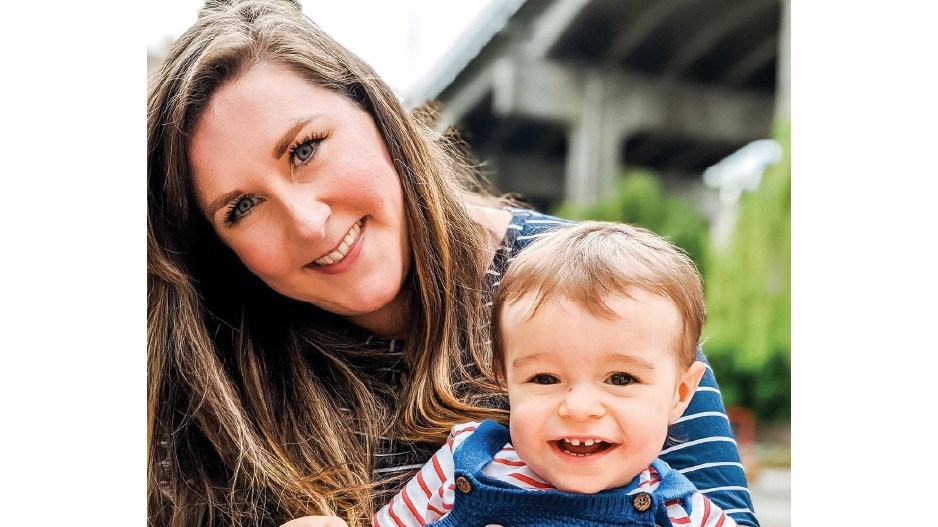Knowing how difficult it would be to get her son Dylan into daycare in B.C., Michèle Damjanovic said she signed up for the service while she was still pregnant. What she wasn’t prepared for, however, were the challenges she would face returning to the workforce in the wake of the COVID-19 pandemic.
“I was supposed to be returning to my role as head of operations at an audio-visual company, but it folded during COVID-19 – technically just before, but no hope of reopening due to the pandemic – so it’s been a big struggle for me to find another position,” the 34-year-old said.
Damjanovic said she’s also been turned down for more junior roles than she is qualified for, and feels she’s at a disadvantage because she has a young child. She noted that there is a great deal of competition right now, as well as some hesitation around daycares and schools closing again.
“Companies are not going to prioritize a risky candidate when they can go for a younger candidate with no kids and lower wage expectations,” she said.
Dylan celebrated his first birthday on August 8 and was set to begin daycare on September 1. While he is generally a social boy, Damjanovic said she has noticed a drastic change in his behaviour due to the pandemic.
“He has really suffered from not socializing at baby groups and in general,” she said. “The first time he saw another child after a couple of months, he cried and wanted me to pick him up. He had never done that before and has always been so independent so it was very unexpected.
“Right now, he will really cry and need comforting any time he sees a man he doesn’t recognize. He got so upset last week in the food court, staring at a man nearby and screaming, that the man had to change tables. Part of it is developmental, but I know a big part is lack of socialization at a critical time of his development.”
Child care in the city
Having worked at Vancouver’s Sunshine Corner Daycare since 1992, head supervisor Sandra Cheng said she’s seen a great deal of changes to child care in the province. And while she said government has made child care more affordable for parents, she feels there isn’t enough space available for children who need it.
In the midst of the COVID-19 pandemic, Cheng said a number of daycare centres closed. A number have since reopened, but she said a few are reluctant to do so.
“I think a lot of parents don’t have daycare so they can’t go back to work,” she said. “That’s the bottom line. There’s really a lot of shortage for 18 months to 36 months. There’s a big demand for that age group.”
Cheng notes that there is also a huge demand for early childhood educators (ECE) and is thankful they were able to hire another full-time staff member over the summer. She adds that the ratio of children to teachers in the 18-to-36-month demographic is four-to-one.
Supporting front-line workers
Samantha Aird, manager at Kidzone South in South Park Elementary School in Delta, underscores Cheng’s sentiment, stating that daycare is an essential service, particularly for front-line workers.
“There’s no way that you could have your doctors, nurses, firemen, police officers and grocery store workers going to work if they have to take care of their kids,” she said.
While most children have returned to her daycare, Aird notes that capacity was reduced to 10% at the start of the pandemic. After a couple of months, she began to see children slowly return. Now, she said all of her 32 spots are full for the fall. What’s more, she’s had to turn down many parents. However, she said some people are reluctant to bring their kids back to daycare while a few others have chosen not to.
“Families who rely on grandparents to babysit, and maybe only come to daycare three days a week because the grandparents take care of them two days a week, those families are far more reluctant to come back.”
Aird said that she didn’t have to reduce class sizes because Kidzone South already met the requirements for COVID-19 physical distancing. That said, she notes that it isn’t easy to keep toddlers physically distanced at all times. She said her staff are front-line workers, as they work in close contact with children daily.
In terms of affordability, Aird noted that the government has stepped up to provide help for families with young children, but feels there isn’t enough financial aid for school-aged kids.
“My issue with the subsidy program right now is that it’s great if you have an infant toddler. It’s pretty good if you have a group-aged child – so three to five. But as soon as they start going to school the funding really, really drops off,” she explained.
“I know their kids are going to school and their daycare fees are less, but they’re still paying the fees and they’re still providing food and these kids are now probably going into other kinds of programs.”
When Aird spoke with Women in Business, she expressed some concerns about schools reopening, but was optimistic.
“I know that the schools are doing everything that they can to make this a safe place to be.”




